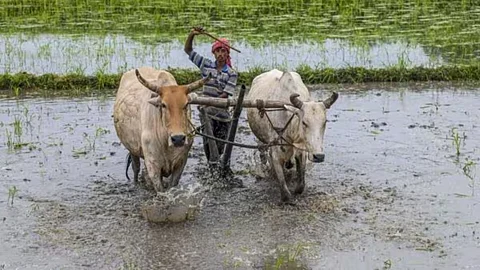

The Union Cabinet, chaired by Prime Minister Narendra Modi, has cleared several key initiatives linked to India's farm sector and outlays for them previously approved in the annual budget.
The Cabinet rationalised centrally sponsored agriculture schemes into two umbrella programmes—the Pradhan Mantri Rashtriya Krishi Vikas Yojana (PM-RKVY) and the Krishonnati Yojana (KY), with a combined budget of just over ₹1 trillion.
PM-RKVY aims to increase farmers' incomes through a bouquet of schemes while KY seeks to boost nutrition levels in lower and mid-income families among other things.
The Cabinet also approved a National Mission on Edible Oils – Oilseeds (NMEO-Oilseeds) for the period 2024-25 to 2030-31, to make India self-reliant in oilseed production within seven years. The total fund outlay for this initiative is ₹10,103 crore.
Of the total proposed expenditure of ₹1,01,321 crore for the two umbrella schemes, the central share will be ₹69,088 crore, while states will contribute ₹32,232 crore. The share of PM-RKVY will be ₹57,074 crore while KY gets ₹44,246 crore.
“These initiatives are set to promote sustainable farming practices and ensure food security, crucial for achieving long-term agricultural self-sufficiency in India,” said Ashwini Vaishnaw, Union Minister for Information & Broadcasting.
The government’s decision to integrate multiple schemes into PM-RKVY and KY is for streamlining efforts, minimising resource duplication, and addressing emerging agricultural challenges.
“As we concentrate on the emerging challenges and opportunities in agriculture, this scheme will empower State governments to develop comprehensive strategic plans tailored to their specific agricultural needs. By facilitating the simultaneous approval of Annual Action Plans and building upon initiatives such as the Digital Agriculture Mission and the Clean Plant Programme, this framework aims to enhance farmers' incomes and ensure food security for low and middle-income families,” Mr Vaishnaw said.
“Under PM-RKVY, farmers will benefit from initiatives promoting soil health management, rainfed area development, and micro-irrigation under the 'Per Drop More Crop" programme,” the government press release said.
These components are important for enhancing productivity, especially in areas prone to water scarcity and erratic rainfall.
Additionally, with the growing importance of organic farming, schemes like Paramparagat Krishi Vikas Yojana aim to provide farmers with resources and market linkages to switch to sustainable agricultural practices, improving their income prospects in the long run.
The KY, on the other hand, will focus on ensuring food security and increasing India’s self-reliance in agricultural production.
Tthe Cabinet allocated ₹63,246 crore for Phase-II of the Chennai Metro, aimed at enhancing connectivity in Tamil Nadu's capital.
The Cabinet approved the productivity-linked reward (PLR) initiative for 20,704 employees from major port authorities and dock labour boards, allocating ₹198 crore for this incentive, alongside a productivity-linked bonus (PLB) of ₹2,029 crore for over 1.17 million railway employees, reflecting their outstanding performance.
On energy security, the Cabinet decided that India will join the Energy Efficiency Hub under the International Energy Agency to foster global relationships in the domain with other member nations such as the USA, the UK, China, France, Russia, and Korea, among others.
The Bureau of Energy Efficiency under the Ministry of Power will be the implementing agency for the hub, the minister said. The decision will help India raise issues of energy efficiency on the global stage, and allow knowledge sharing in the sector.
(By arrangement with livemint.com)